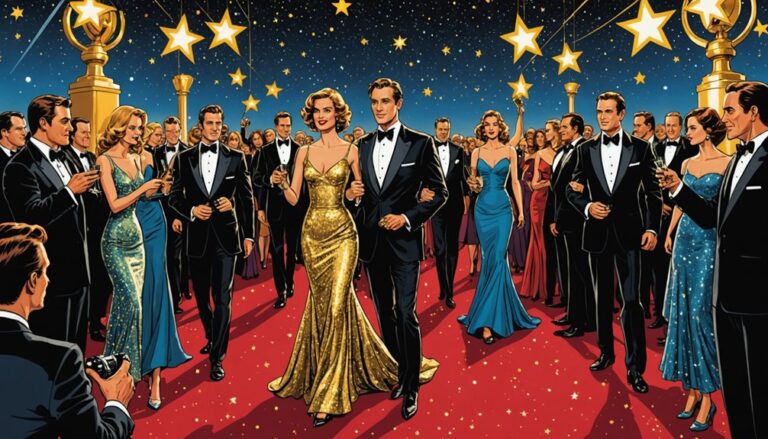Are U Not Entertained
The phrase "Are you not entertained?!" from the film Gladiator highlights the tension between spectacle and morality. Spoken by Maximus, it questions society's fascination with violence as he confronts the audience's complicity in brutality. This moment reflects Maximus's struggle for identity, torn between his past as a general and his role as a gladiator. The themes of honor, duty, and revenge intertwine throughout the film, particularly in Maximus's response to Commodus's tyranny. Both characters illustrate the cycle of violence and its consequences in ancient Roman culture. Exploring these themes reveals deeper insights into contemporary societal values and conflicts.
Iconic Quotes From Gladiator
One of the most powerful lines in cinematic history, "Are you not entertained?!" embodies the essence of Maximus's character in *Gladiator*. This quote is delivered during a pivotal moment in the Colosseum, highlighting the themes of spectacle and the audience's complicity in the violence of gladiatorial combat.
It serves as a critical commentary on the nature of entertainment, illustrating Maximus's defiance in a world where he is merely a source of amusement. The phrase has become an iconic representation of Gladiator symbolism, reflecting not only Maximus's personal struggle but also society's fascination with brutality.
Its emotional resonance reinforces the film's exploration of honor and revenge, cementing its cinematic impact and legacy over the past two decades.
Maximus's Struggle for Identity
Maximus's journey in *Gladiator* is marked by a profound struggle for identity, a conflict that becomes increasingly evident as he grapples with the duality of his existence.
His declaration, "Are you not entertained?!" highlights his identity crisis. Maximus is torn between his former role as a respected general and the brutal reality of being a gladiator. This tension complicates his self-discovery, as he seeks to reclaim his honor while confronting the crowd's complicity in the violence.
Throughout the film, he embodies the reluctant hero, battling not only external foes but also his own sense of duty to Rome. Maximus's journey illustrates the challenge of maintaining personal integrity within a public identity shaped by circumstances beyond his control.
The Role of Revenge
In "Are U Not Entertained," revenge serves as a powerful motivation for Maximus, driving him to seek justice for the murder of his family.
His quest highlights the consequences of vengeance, as it not only fuels his strength but also leads to personal turmoil.
As Maximus himself states, "Are you not entertained?" This question reflects the complex relationship between violence, morality, and the audience's role in the spectacle of revenge.
Vengeance as Motivation
Driven by profound loss and betrayal, vengeance serves as a compelling motivation for Maximus in "Gladiator." The brutal murder of his family and his treachery at the hands of Commodus catalyze his transformation from a respected general to a fierce gladiator.
Maximus's revenge motivation drives his actions, as he seeks to restore honor and achieve justice for his family's death. He embodies a symbol of hope for the oppressed, using his strength to fight against tyranny.
Maximus's internal struggles highlight the emotional toll of revenge, impacting his relationships and sense of self. Ultimately, his justice pursuit culminates in a climactic confrontation with Commodus, emphasizing the complexity of revenge as a motivating force in his life.
Consequences of Revenge
The pursuit of revenge, while initially serving as a powerful motivator for characters like Maximus, ultimately reveals its profound consequences.
Maximus's quest against Commodus illustrates how personal vendettas can consume individuals. The psychological impact is significant; as he seeks vengeance, he faces emotional tolls, leading to isolation and loss.
This transformation from a loyal general to a gladiator showcases how the desire for retribution can alter one's identity. Additionally, the moral implications of revenge are evident, as it often perpetuates a cycle of violence.
Commodus's downfall highlights this, as his manipulation leads to his own demise. The film critiques revenge as justice, suggesting it harms not only the avenger but also those around them, emphasizing the destructive nature of vengeance.
Commodus's Downfall
Foreshadowing his inevitable downfall, Commodus's arrogance and delusions of grandeur create a precarious foundation for his reign.
His dismissive question, "Have I missed the battle?" illustrates his unpreparedness for true leadership. Seeking public approval, he staged violent spectacles in the arena, believing bloodshed would win the masses' favor.
However, this backfired, alienating both the Senate and the people. The pivotal moment of Commodus's defeat occurs during his final confrontation with Maximus. Underestimating Maximus's combat prowess, he faces his demise, symbolizing the collapse of his tyranny.
His attempts to eliminate rivals through deceit reveal his moral corruption. Ultimately, the public's disillusionment with Commodus highlights that his downfall results from his arrogance and overreaching ambition.
Themes of Honor and Duty
Honor and duty are central themes in "Gladiator," intricately woven into the fabric of Maximus's character and journey. He faces a significant moral conflict as he seeks vengeance for his family's murder while fulfilling his duty as a gladiator.
The phrase "Are you not entertained?" highlights his defiance against the brutal nature of the games, questioning the true meaning of honor. Maximus embodies personal integrity, contrasting sharply with characters who prioritize power.
His loyalty to Rome further complicates his quest for revenge, as he must reconcile his obligations to the people he leads with his personal desires.
Ultimately, "Gladiator" explores how the pursuit of honor can clash with the expectations of duty in a corrupt society.
The Legacy of Marcus Aurelius
Maximus's struggle with honor and duty finds a philosophical counterpart in the legacy of Marcus Aurelius, whose teachings resonate throughout history.
As a Stoic philosopher and Roman Emperor, Aurelius emphasized rationality and self-control. His famous work, "Meditations," reflects on duty, virtue, and existence. He taught that one should focus on what is within their control and accept what is not.
His reign marked the height of the Pax Romana, showcasing effective leadership during challenging times. Remembered as one of the last "Five Good Emperors," Aurelius set a standard for ethical governance.
His principles continue to influence modern thought, particularly in personal resilience and ethical leadership. Aurelius stated, "The happiness of your life depends upon the quality of your thoughts."
Emotional Depth in Dialogue
Dialogue in film serves as a powerful vehicle for conveying emotional depth, and few lines resonate as profoundly as the iconic phrase, "Are you not entertained?!"
This moment crystallizes the internal conflict faced by Maximus, shifting from a revered general to a reluctant gladiator. The dialogue impact of this quote highlights Maximus's struggle against the brutal spectacle of Roman culture. His challenge to the crowd reflects a desperate plea for agency and dignity.
This line prompts viewers to reflect on their own reactions to violence and entertainment. The emotional resonance of Maximus's words, contrasted with the audience's mindless enjoyment, adds layers to the narrative, enhancing the film's themes of honor and revenge while emphasizing the complex dynamics between characters and spectators.
The Spectacle of Gladiatorial Combat
The spectacle of gladiatorial combat was a significant aspect of ancient Roman culture, driven by a deep-seated bloodlust among the populace.
As Maximus famously asks, "Are you not entertained?", this question encapsulates the thrill and violence that defined these brutal events.
Gladiators not only fought for their lives but also served as symbols of heroism, enchanting audiences while reinforcing the social structures of their time.
Bloodlust in Ancient Rome
Emerging from the dusty annals of history, gladiatorial combat in Ancient Rome stands as a fascinating yet chilling proof of the public's fascination with violence. The crowd dynamics during these events often reflected a disturbing bloodlust. Spectators cheered as gladiators fought, showcasing a psychological response that blurred the line between entertainment and brutality. Emperors used these spectacles to distract the populace from political issues.
| Aspect | Description |
|---|---|
| Gladiator Psychology | Combatants often faced death, influencing their motivation and behavior. |
| Crowd Dynamics | Audience reactions fueled the intensity of the fight, creating a cycle of violence. |
The thrill derived from bloodshed highlights the darker elements of human nature, raising moral questions about the society that celebrated such events.
Maximus as Symbolic Hero
Maximus stands as a quintessential symbol of the moral complexities surrounding gladiatorial combat in Ancient Rome, epitomizing the tension between heroism and complicity. His iconic line, "Are you not entertained?!" challenges the audience's role in the brutal spectacle, highlighting the moral ambiguity of their enjoyment.
The Colosseum, a grand yet cruel setting, underscores this duality of violence and glory. Maximus's journey from general to gladiator represents a heroic sacrifice, as he transforms into a light of hope for the oppressed.
His internal conflict is evident as he questions the crowd's bloodlust, revealing the darker side of their entertainment. Ultimately, Maximus embodies the struggle between noble ideals and the harsh realities of societal values in ancient Rome.
Cultural Reflections on Violence
Cultural reflections on violence often reveal deep-seated societal patterns and ethical dilemmas, as seen in the enduring legacy of gladiatorial games in ancient Rome. The phrase "Are you not entertained?" from Maximus critiques the audience's complicity in violence. Gladiatorial combat served not just as entertainment but also as a tool for political manipulation. Studies show that media desensitization can shape perceptions of acceptable behavior, similar to how Romans reacted to blood games. This normalization of violence raises ethical questions about our contemporary consumption of aggressive sports and media.
| Aspect | Ancient Rome | Modern Society |
|---|---|---|
| Entertainment | Gladiatorial games | Violent films/sports |
| Audience Reaction | Applauded violence | Often desensitized |
| Political Influence | Controlled sentiment | Media influence |
| Ethical Concerns | Suffering for sport | Glorification of aggression |
Anticipation for Gladiator 2
With the announcement of "Gladiator 2," excitement has surged among fans keen to witness the continuation of a beloved cinematic saga.
Many eagerly await how the sequel will maintain the emotional depth of the original film, which won the Best Picture award in 2001. Fans have shared various fan theories about potential character arcs and the legacy of Maximus.
They wonder if new characters will emerge, resonating with themes of revenge and honor. Expectations are high for impactful dialogue, especially given iconic lines like "Are you not entertained?"
Despite production delays, updates on the cast and plot developments keep interest alive. Audiences hope "Gladiator 2" meets or exceeds the monumental standard set by its predecessor.







